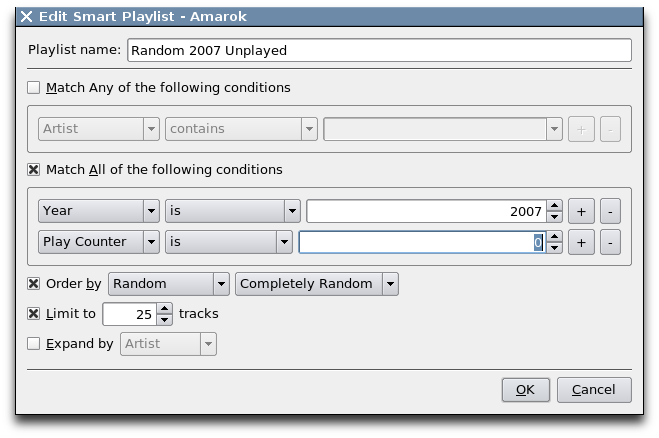Then you can make a smart playlist like this:

* NOTE: backup your database first
#! /usr/bin/env python
import sys, time, MySQLdb
from musicbrainz2.webservice import Query, ReleaseFilter
db = MySQLdb.connect(db="DB_NAME", user="DB_USER", passwd="DB_PASS", use_unicode=True, charset="utf8")
c = db.cursor()
c.execute("""SELECT a.name as 'artist', a.id as 'artist_id', b.name as 'album', b.id as 'album_id' FROM `artist` a INNER JOIN `tags` t ON a.id = t.artist INNER JOIN `album` b ON t.album = b.id WHERE t.year = 1 AND t.sampler = 0 GROUP BY a.id, b.id ORDER BY a.name ASC""")
print "%d rows" % c.rowcount
albums = c.fetchall()
for (artist, artist_id, album, album_id) in albums:
if (artist and album):
time.sleep(1)
q = Query()
print "Looking up: %s - %s" % (artist, album)
f = ReleaseFilter(artistName=artist, title=album, limit=1)
results = q.getReleases(f)
if results:
result = results[0]
release = result.release
print "Found: %s - %s" % (release.artist.name, release.title)
if (release.releaseEvents and release.releaseEvents[0].date):
ymd = release.releaseEvents[0].date.split('-');
print ymd[0];
c.execute ("""SELECT `id` FROM `year` WHERE `name` = %s""", (ymd[0]))
year_id = c.fetchone()
if year_id:
c.execute ("""UPDATE tags SET year = %s WHERE artist = %s AND album = %s""", (year_id[0], artist_id, album_id))
else:
print "No results"
print
c.close()
db.close()